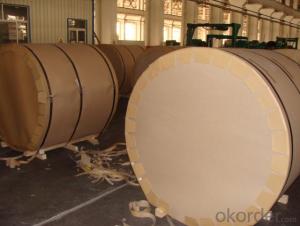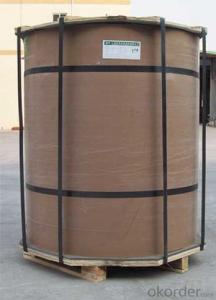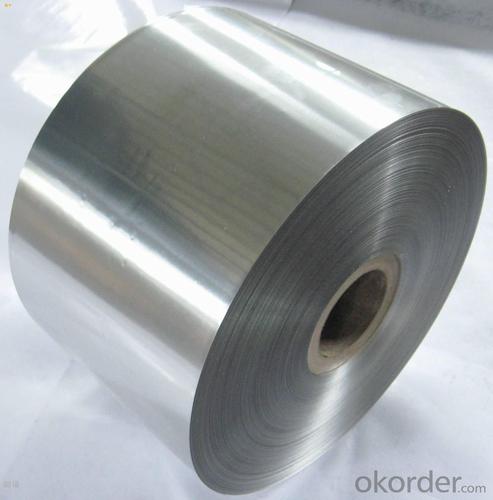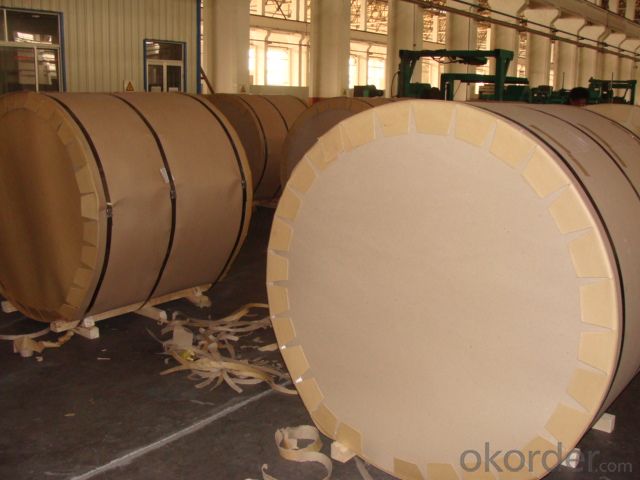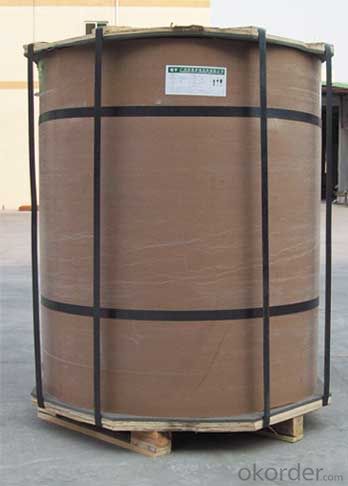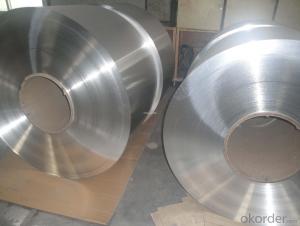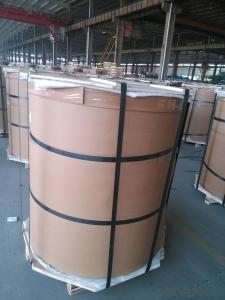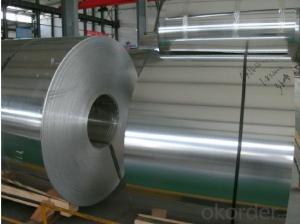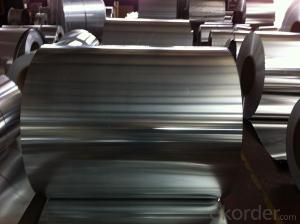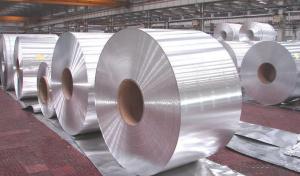Aluminum Coils Inc Tampa AA1070 Aluminum Coils Used on Construction
- Loading Port:
- Shanghai
- Payment Terms:
- TT OR LC
- Min Order Qty:
- 5 m.t.
- Supply Capability:
- 10000 m.t./month
OKorder Service Pledge
OKorder Financial Service
You Might Also Like
1.Structure of AA1070 Aluminum Coils used on Construction Description
AA1070 Aluminum Coils used on Construction has great ductility, heat conductivity, anti-corrosion and moisture resistance properties.
AA1070 Aluminum Coils used on Construction is widely used for PP cap stock, hot rolled thick plate, PS base plate, aluminum curtain wall base plate, the traffic sign ,air-conditioner heat and exchangers, food container, household foil, pharmaceutical packing, cigarettes packing.
2.Main Features of AA1070 Aluminum Coils used on Construction
• Superior quality of raw material
• Reasonable and stable chemical composition
• Accurate tolerance
• Goode mechanical property
3.AA1070 Aluminum Coils used on Construction Images
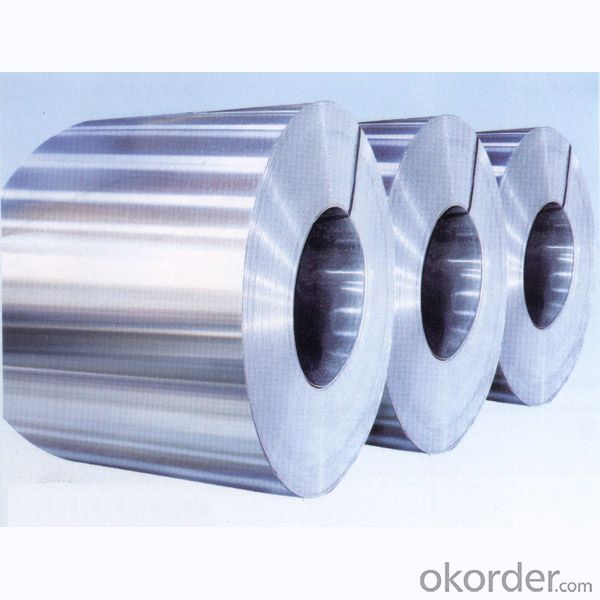
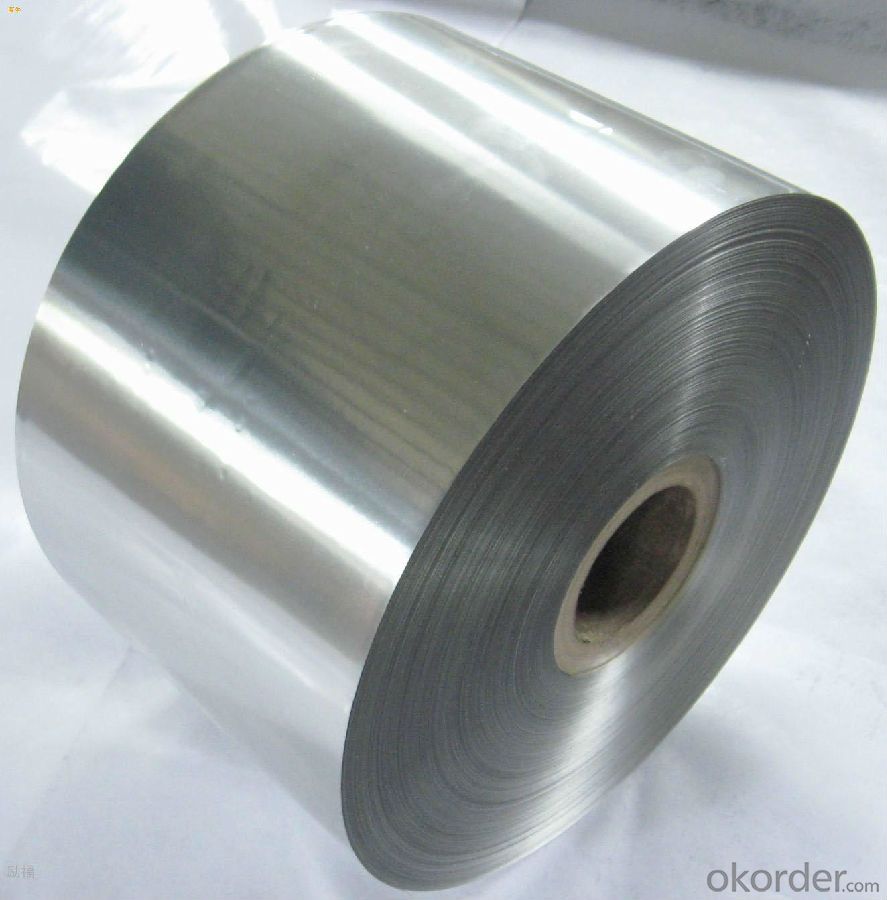
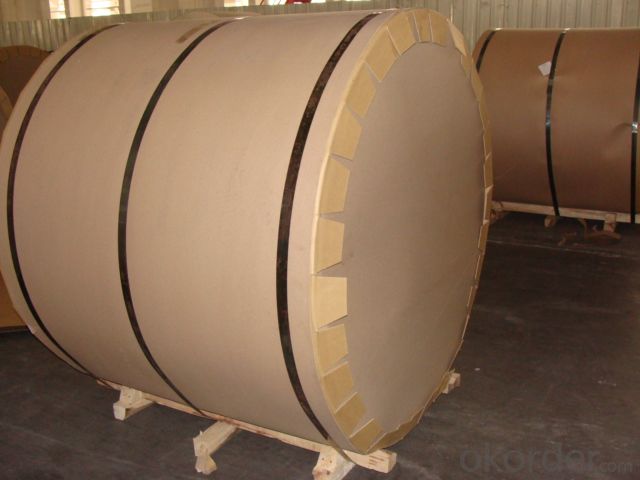
4.AA1100 Aluminum Coils used on Construction Specification
Alloy | A1070 |
Temper | H14, H16, H18, H22, H24, H26, H32, O/F |
Thickness | 0.2mm -- 100mm |
Width | 30mm -- 1700mm |
Standard | GB/T 3880-2006,EN,ASTM,JIS |
5. FAQ of AA1100 Aluminum Coils used on Construction
A.How to guarantee the quality?
Customers are welcome to our mill to visit and check the products. Besides, we can arrange a third party to test AA1070 Aluminum Coils used on Construction.
B.When will you deliver the products?
AA1070 Aluminum Coils used on Construction will be delivered within 35 days after receiving advanced payment or original L/C.
- Q: Is the aluminum coil with damaged side still useful?
- The side of tire, also called side wall, is the thinnest and most fragile. Side wall damages can be divided into swell and scratch. The swell is often caused by external force (The car is trapped in pit or on curb when you are driving fast). It can cause the cord thread break so that the rubber of the tire side wall cannot be fixed and tightened. The size of the swell is often as big as that of an one-yuan coin and will become bigger as the traveling distance increases. Under such circumstance, it is recommended to replace the tire. Scratch is usually caused by bad roads or debris on the road. It is recommended to replace the tire if the scratch in the side wall is obvious and the cord thread break. If the front wheels have such damages, the tire should be replaced as soon as possible (Because the steering, braking and driving is mainly based on the front wheels.). If there is no spare tire on site, change the front damaged tire with the rear tire and drive to an appropriate place.
- Q: Can aluminum coils be used in low-friction applications?
- Yes, aluminum coils can be used in low-friction applications. Aluminum is a lightweight and corrosion-resistant material that has excellent thermal conductivity. These properties make it suitable for various applications where low-friction is desired. In industries such as automotive, aerospace, and HVAC systems, aluminum coils are often used in heat exchangers, evaporators, condensers, and cooling coils. These coils are designed to efficiently transfer heat, while minimizing friction and energy loss. Additionally, aluminum coils can be used in electrical motors, generators, and transformers, where low friction is essential for smooth operation and reduced energy consumption. The lightweight nature of aluminum also helps to reduce the overall weight of the system, leading to improved efficiency. Furthermore, aluminum coils can be utilized in various types of machinery and equipment that require low friction, such as conveyor systems, sliding mechanisms, and bearings. Aluminum's low coefficient of friction allows for smooth and efficient movement, minimizing wear and tear on the components. Overall, aluminum coils are a versatile solution for low-friction applications due to their lightweight, corrosion-resistant, and thermally conductive properties. Their use can lead to improved energy efficiency, reduced maintenance costs, and enhanced performance in a wide range of industries.
- Q: Can aluminum coils be welded?
- Yes, aluminum coils can be welded.
- Q: Are aluminum coils resistant to mold and mildew?
- Generally, aluminum coils have resistance to mold and mildew. Unlike materials like wood or fabric, aluminum is non-porous and does not absorb moisture. This characteristic reduces its susceptibility to mold and mildew growth. Moreover, protective finishes are often applied to aluminum coils, enhancing their resistance to mold and mildew. Nevertheless, it is important to remember that although aluminum coils are less prone to mold and mildew, they are not entirely immune. If exposed to excessive moisture or humidity, mold and mildew can still develop. Thus, regular cleaning and maintenance are essential to prevent potential mold or mildew growth.
- Q: Is it possible to utilize a punching machine to create holes in steel coils for decorative purposes?
- <p>Yes, you can use a punching machine to punch holes in steel coils for decoration purposes. Punching machines are designed to create precise holes in various materials, including steel. For steel coils, ensure the machine is capable of handling the thickness and hardness of the steel. It's important to select the right punch and die material, and consider the coil's strength and ductility. Always follow safety guidelines and machine specifications to prevent damage or injury.</p>
- Q: Are there any restrictions on the export or import of aluminum coils?
- Yes, there are restrictions on the export or import of aluminum coils. These restrictions can vary depending on the country and the specific regulations in place. Some common restrictions include export licenses, quotas, and tariffs. Export licenses may be required to ensure compliance with export control regulations, especially for sensitive industries or countries. Quotas may limit the quantity of aluminum coils that can be exported or imported within a specific time frame. Tariffs are taxes imposed on imported goods, which can affect the cost and competitiveness of aluminum coils in the market. Additionally, there may be restrictions related to quality standards, environmental regulations, or trade agreements between countries. It is important for individuals or businesses involved in the export or import of aluminum coils to thoroughly research and understand the specific restrictions in their respective jurisdictions. Consulting with legal or trade experts can be helpful in navigating these restrictions and ensuring compliance with applicable laws.
- Q: For the reaction at the anode:Al ----gt; Al3+ + 3eHowever, at the anode, oxygen are also produced and forms aluminium oxide(Al2O3) with aluminium.Are Oxygen produced by oxidation of water by electrolysis? or some reaction else?If Oxygen are produced by oxidation of water, then why it can be oxidise sinceAl ----gt; Al3+ + 3e E^0= + 1.66V2H2O ---gt; O2 + 4H+ + 4e E^0= - 1.23V(if refers to E null value) Oxygen should only be produced after all the Al have been finish oxidised.Both reaction happen at the same time? Is it possible?
- Anodising is a process in which the surface of a metal is modified. In the case of anodising aluminum the layer of aluminum oxide is made thicker. This is done by placing the aluminum in a sulfuric acid solution and passing a current through it so that it serves as an anode-the current releases oxygen at the surface of the aluminum increasing the aluminum oxide. I'm pretty sure this is from the reaction of the electric charge and the sulfuric acid producing oxygen as you showed in your last reaction with water. I hope this was helpful, I'm at work and don't have my old chem books and I dont' remember all this stuff off the top of my head.
- Q: 1) Do you recycle aluminum (soda cans, etc.)?2) Why do or don't you recycle aluminum?3) Does it make a difference to the economy whether we recycle or not?4) Does it make a difference to the environment whether we recycle or not?5) What do you think would help people to recycle more? Such as a reward, information, resources, etc. Don't feel the need to limit responses. Thank you.
- 1) Yes, I recycle aluminum. 2) I recycle to help from having to have so much in garbage dumps and to get a little extra cash. 3) I feel that recycling helps the economy by reusing aluminum and not having to spend so much time money manufaturing new aluminum and creating some jobs in the recycling field. 4) Recycling aluminum helps the environment by having less aluminum in land fills or alongside the roads. 5) I think more people would recycle aluminum if there was a reward or if you could get a higher price for the aluminum when recycling. Too many people feel the amount of money they can get for reycling aluminum, is not worth their time or the trouble.
- Q: i came across marine grade aluminum (grade 6082), somebody was telling it is a special grade, i checked in internet, there is nothing specific in marine grade 6082, every manufacturer can produce it. please clarify. thanks
- Marine grade means a specific alloy that resists corrosion, and does not deform easily. Alloys in the 5000 series as well as some 6000 are considered marine grade.
- Q: This question is asking for methods or strategies to protect aluminum coils from rusting.
- <p>To prevent aluminum coil from rusting, it's important to understand that aluminum doesn't rust like iron does; it forms a protective oxide layer that prevents further corrosion. However, to maintain the integrity of the aluminum coil and prevent other forms of degradation, you can: 1. Store the coils in a dry environment to avoid moisture-induced corrosion. 2. Apply a protective coating or lacquer to the surface. 3. Use anti-corrosion packaging materials during transportation and storage. 4. Regularly inspect the coils for any signs of damage or corrosion and address them promptly. 5. Avoid contact with aggressive chemicals that can break down the protective oxide layer. Proper handling and storage are key to maintaining the quality of aluminum coils.</p>
Send your message to us
Aluminum Coils Inc Tampa AA1070 Aluminum Coils Used on Construction
- Loading Port:
- Shanghai
- Payment Terms:
- TT OR LC
- Min Order Qty:
- 5 m.t.
- Supply Capability:
- 10000 m.t./month
OKorder Service Pledge
OKorder Financial Service
Similar products
Hot products
Hot Searches
Related keywords

